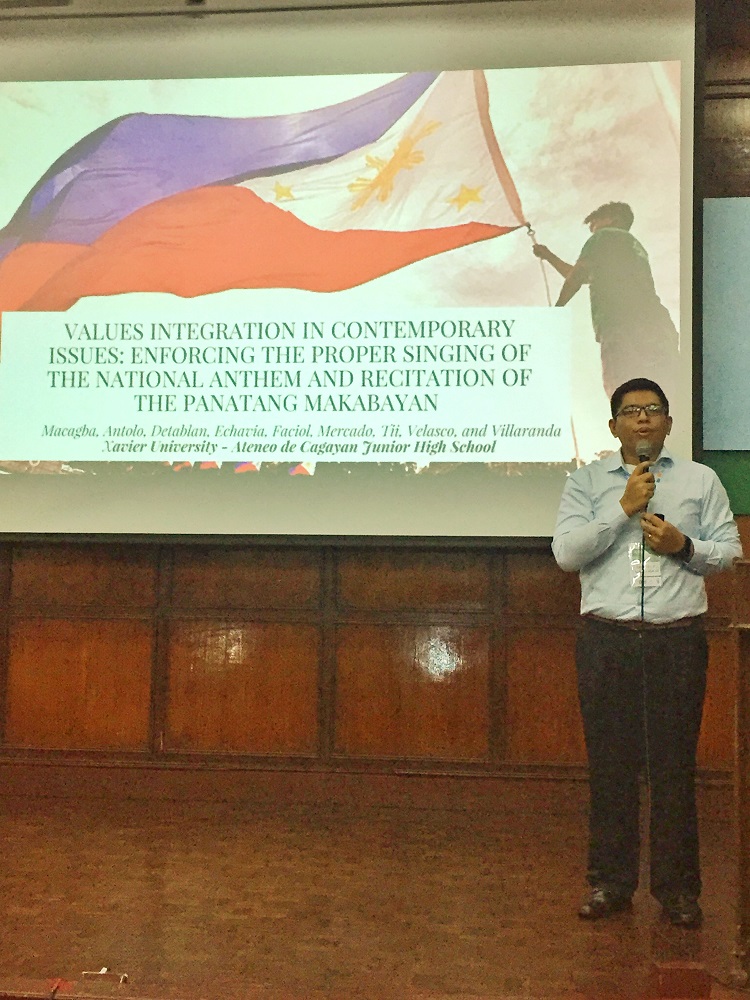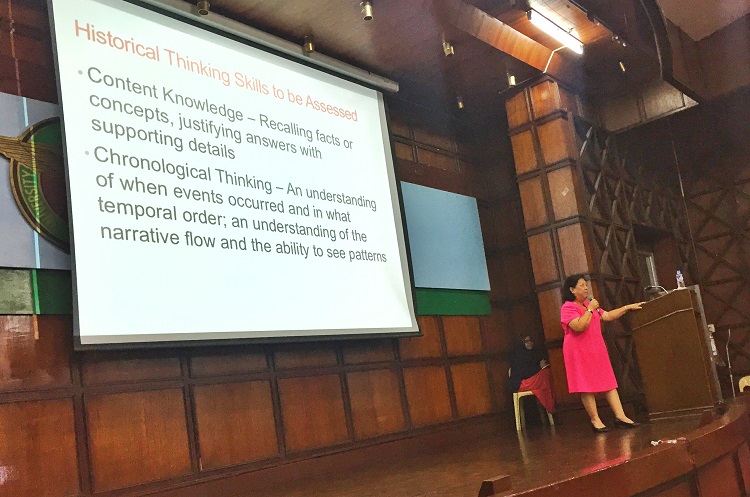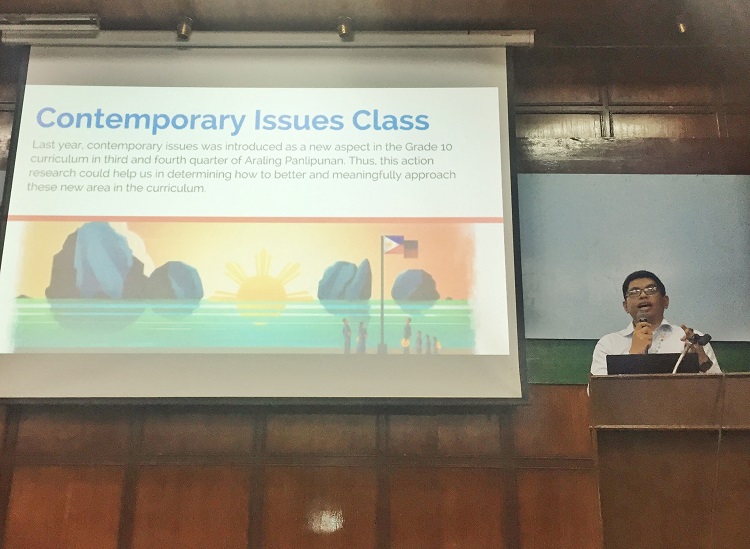
The Araling Panlipunan department of Xavier University - Ateneo de Cagayan Junior High School (XUJHS) shared their action research titled “Values Education in Contemporary Issues: Enforcing the Proper Singing of the National Anthem and Recitation of the Panatang Makabayan” at the 4th National Conference on Social Studies Education in the Philippines.
The paper explored the strategy of Values Integration to improve the attitude of JHS students towards singing the National Anthem and reciting the Panatang Makabayan.
The XUJHS paper was one of the researches chosen by the confab organizers in one of the parallel sessions. On behalf of the AP department, Samuel Macagba III, assistant principal for formation of JHS, presented the results of their study.
The study revealed that there is a need for various units of the university to converge and to articulate and plan in a strategic manner the identification of the "formation competencies" since interventions to target these competencies should both start early and be sustained up until the last phase of a student's JHS education.
In the conference, participants coming from various educational institutions across the Philippines affirmed that the concern shared in the said action research is also happening in most of their schools.
The participants realized the need to re-strategize to improve how students sing the National Anthem and recite the Panatang Makabayan. Consistent with the goals of the Araling Panlipunan curriculum, the whole school community should work together in forming students to be good Filipino citizens.
Other talks on the key areas in the teaching of social studies were also included in the conference to provide educators a better view on improving assessment practices, thereby, developing further the thinking skills of students.
The conference, held from April 26 to 28, organized by the University of the Philippines College of Education Social Studies Area in partnership with the Organization of Social Studies Teachers in the Philippines Inc, bearing the theme “Measuring Thinking Skills through Classroom Assessment in Social Studies.”
AP's paper was first presented in March 2018 during the XU Junior High School's annual Action Research Paper Conference, organized by the Formation Council to empower the faculty and staff to engage in solving school concerns through research.
Shaping the thinking process
The three-day conference also provided teachers with strategies on how to improve the teaching of Social Studies in the various grade levels. Specialists in the four major areas in social studies (Sociology, History, Geography, and Economics) were invited to share their insights.
Dr Dina Joan Ocampo, former undersecretary of the Department of Education, focused her talk on the value of integration.
“If you are a teacher, integrating is and should be a second nature," she said, adding that teachers should see the curriculum not just as a list of competencies but "webs where students can see connections and meaning." The innovations teachers do in the classroom should always be rooted to the locus of education, which are the students.
Ocampo added, "We are aware that our role is to develop students to become good citizens, yet we have very little understanding of how we can concretely achieve this."
She, then, connected the challenge with the value of assessment and personalized education, where students should be empowered to assess themselves, promote self-reflection, and accountability with their own learning.
UP Sociology associate professor Dr Manuel Victor Sapitula pointed out the importance of Sociological Imagination in the classroom. He defined this as a skill that allows students to use pieces of information to tell what is happening in the world and within themselves. He added that Social Studies should help students make sense of the world and how they would understand themselves better.

TEACHING HISTORY. Dr Ma Luisa Camagay from UP College of Social Science and Philosophy shares on new ways on how to teach History to high school students. Supplied photo.
On the other hand, while the students are said to be the locus of education, teachers play a crucial role in the development of the child. Dr Ma Luisa Camagay from UP College of Social Science and Philosophy said: "The human past is something interesting. When students do not like history, there must be something wrong that we are doing." Teachers, therefore, must have the ability to make students feel like they are “historians” who are curious about the world and capable to make judgments based on research.
In the end, the participants were reminded by Dr Agustin Arcenas from the UP School of Economics that when the students leave our classroom, it is hoped that we have helped them see the world differently. The goal of education is not just to merely memorize facts and models with no link to reality.
But rather, as Arcenas said, "We need to reflect if we are adding to the confusion or are we shaping the thinking process of our students to be more analytical."∎

ACTION RESEARCH. On behalf of the AP department, Samuel Macagba III, assistant principal for formation of JHS, shares the results of their study “Values Education in Contemporary Issues: Enforcing the Proper Singing of the National Anthem and Recitation of the Panatang Makabayan” at the 4th National Conference on Social Studies Education in the Philippines. Supplied photo.